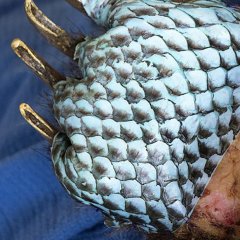World Ocean Radio - Human Health and Medicine

A November visit to Gloucester Massachusetts for an Ocean Literary Conference (NEOSEC 2023) afforded W2O staff an opportunity to take a field trip to the Gloucester Marine Genomics Institute. Founded in 2008, the Institute is on the cutting edge of 21st century science, studying the marine environment for solutions to issues facing the ocean, sustainably fisheries, human health, to better understand ecosystems, and the ocean's medicinal value for today and tomorrow. In addition to their state-of-the-art research laboratories, GMGI is promoting technical training for lab techs through their Biotechnology Academy, a no-cost, year-long certificate training program with astonishing results.
We are nearing the end of the RESCUE series. This week, in its 30th edition, we're talking about water: the well-spring of world ocean health and the essential natural system that sustains us all, thus its protection and sustainability are the key strategy for RESCUE.
This week the multi-part RESCUE series continues with an examination of familiar products derived from the ocean that we use to support our ways of life, our well-being and our health: from vitamins and supplements to pain and cancer treatments. And we discuss the future of exploration and exploitation of resources as the bio-prospecting rush heats up. How are we regulating extraction from the ocean and seafloor? Who owns the proprietary rights to marine resources, and what criteria are applied to protect biodiversity, ocean ecosystems and future resource potential to revolutionize medicine and treat disease?
RESCUE as an acronym offers a plan for specific action and public participation: Renewal, Environment, Society, Collaboration, Understanding, and Engagement.
This summer we are revisiting some of our favorite World Ocean Radio episodes that highlight optimism for the ocean. This week we are discussing an innovative company in Iceland that has developed a product from fatty acid-rich fish skin to treat chronic wounds so that new skin can grow. Called Omega 3 Wound and developed by Kerecis Limited, this FDA-approved skin is grafted onto damaged human tissue such as a burn or a diabetic wound, and is ultimately converted into living tissue. This product illustrates the capacity to use 100% of the fish, thereby maximizing the value of the catch and accelerating economic opportunity around the globe.
Pharmaceutical pollution is as important and critical a factor for public health as microplastics and other chemical wastes that enter the water cycle, marine biota, and our bodies. A recent study by researchers at the Global Monitoring of Pharmaceuticals examined 258 rivers around the world and found that pharmaceutical pollution is contaminating water on every continent.
This week we continue the Earth Optimism Series, a 24-episode project in partnership with the Smithsonian Institution's Ocean Portal, to address ocean solutions and innovative projects in the context of the Earth Optimism Summit, April 2017. In this episode, we discuss publications, reports, and projects which are integral to the evolution of ocean policy and science, including the newest project called the Atlas of Ocean Wealth, published in 2016 by the Nature Conservancy.

